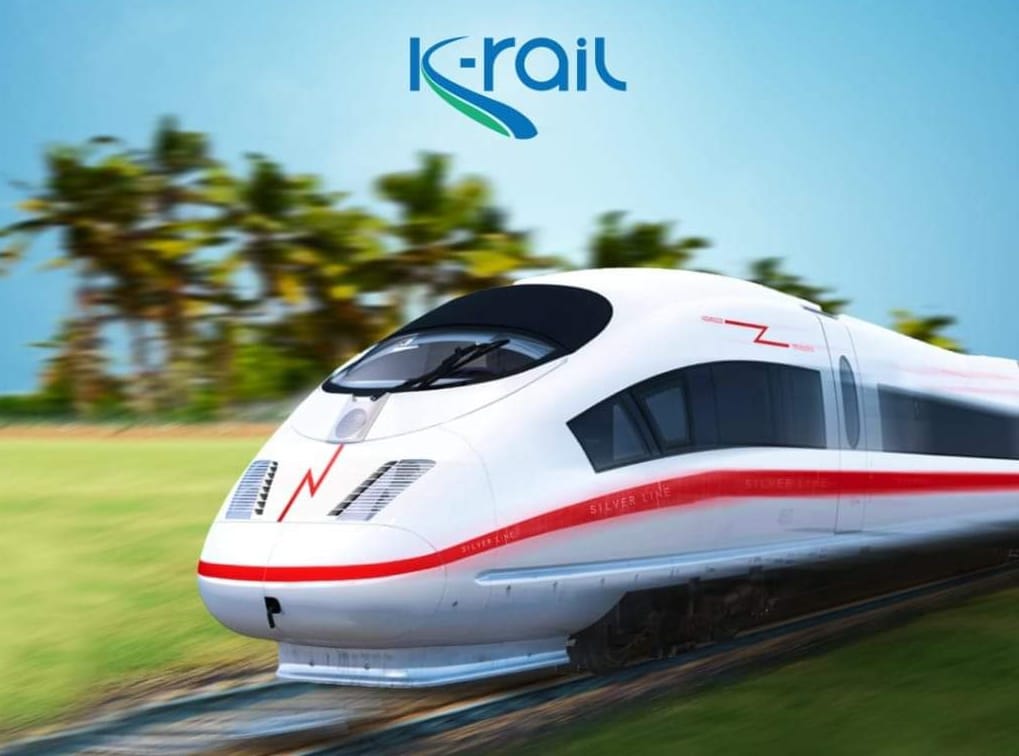Value of land in areas surveyed for the semi-high-speed rail corridor has decreased drastically, over 2,000 people are facing criminal charges.

A promotional poster of the now-shelved SilverLine project. (Sourced)
The CPI(M)-led LDF government in Kerala has shelved its ambitious Thiruvananthapuram to Kasaragod semi-high-speed rail corridor project but the travails of those affected by the plan are far from over.
In an order dated 27 November, the state revenue department recalled all its 204 officials deputed to conduct a social impact study before acquiring land for the project.
The officials, tasked with taking over 1,221 hectares spread over 11 districts, were redeployed to “other essential projects”.
The government shelved the controversial project, pending approval from the railway board, after expending crores of rupees and creating social unrest.
A prestigious project of Chief Minister Pinarayi Vijayan, SilverLine has eaten up ₹56.69 crore for the groundwork alone over the past three years, besides spending another ₹1.48 crore for planting 6,737 survey stones along the corridor’s planned alignment between Thiruvananthapuram and Kasaragod.
The planting of the yellow-coloured stone markers in farmlands and small holdings, ignoring livelihood, sparked large-scale public resentment.
The police often had to use force to install the markers. Criminal cases were registered against those who rooted out the stones from their properties.
The stones were planted as part of a preliminary survey conducted to acquire land for the corridor’s construction.
Though the government had purchased 19,738 survey stones, most of them could not be used due to fierce public opposition. Incidentally, CPI(M) workers, too, were part of the protests at several places.
According to highly placed government sources, the decision to freeze the project was taken after the Union government indicated that permission would not be accorded to the plan due to increasing environmental and livelihood concerns.
Experts who opposed the project said if the Union government accorded the go-ahead for the project, it would have led to a severe economic crisis in the state since its cost would have exceeded ₹63,000 crore.
The state government planned to implement the project with loans from international lending agencies, mainly the Japan International Cooperation Agency.
The semi-high-speed rail project connecting the southern and northern districts was conceived to cut short the travel time between Thiruvananthapuram and Kasaragod. The trains, touching a maximum speed of 230 kmph, were planned to cover the 530-kilometre distance in four hours, instead of the present 12 hours.
The Union government had initially adopted a favourable stand towards the project but later backed off, saying it would lead to the fragmentation of the Kerala society, besides causing irreparable damage to the state economy.
An environmental and livelihood challenge, the project might have caused massive displacement in the state, known for its high population density.
The revenue department stopped the acquisition works six months ago after it ran into stiff opposition.
Though the project has almost been abandoned, the sufferings of the people whose properties were marked for acquisition were still continuing.
According to MT Thomas Mulakulam, who fought against the project in the Kerala High Court, the government orders notifying the alignment and the land requirement have not yet been withdrawn.
Initially, the government claimed that the project would require hardly 955.13 hectares. The remodelled project, however, required 1,221 hectares.
In areas where the survey was conducted and marker stones planted, the land value decreased drastically, angering the affected people.
Besides, financial institutions were denying them loans against properties, citing the lands form part of the SilverLine project. They also point to the government notification regarding land acquisition that was not withdrawn.
Additionally, criminal charges were slapped on more than 2,000 people across the state for participating in protests against the planting of survey stones.
Stringent clauses, including an attempt to murder, were invoked against the protesters. It would be an arduous task for the protesters to complete the court procedures despite the government freezing the project.
After retaining power with a massive mandate in the Assembly election held in April 2021, Vijayan declared that the semi-high-speed railway line would be his government’s priority. The project sparked environmental, social and financial concerns.
Though the government initially said that the new line would be constructed parallel to the existing one, the altered alignment, at many locations, went up to four kilometres away from the existing line, necessitating large-scale land acquisition.
Besides, the proposed line would not have benefitted those in the eastern hill districts. Additionally, the plan emerged as a potential threat to the ecologically fragile Western Ghats as it would have required enormous quantities of granite and loose soil.
In Kerala, all granite quarries are in the Western Ghats.
As the line was planned to pass through wetlands, rivers, paddy fields and lakes, the project demanded massive land reclamations as well. Numerous bridges were planned as part of the project, requiring copious quantities of granite, sand and soil.

Jul 26, 2024

Jul 26, 2024

Jul 26, 2024

Jul 25, 2024

Jul 25, 2024

Jul 25, 2024